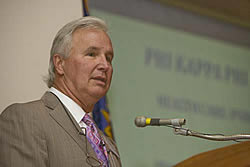Experts discuss problems, solutions to health care system
The U.S. health care system needs to rein in costs, improve quality and increase access for people without health insurance, but the path toward those goals is as cloudy as ever.
That was the consensus of experts who spoke Tuesday at a health care forum sponsored by the East Carolina University chapter of Phi Kappa Phi, the national honor society. The event was in the auditorium of the Brody Medical Sciences Building.

Robert Greczyn speaks during Tuesday’s Phi Kappa Phi health care forum at the Brody School of Medicine at ECU. Photo by Cliff Hollis
Dr. Henry J. Aaron, an economist with the Brookings Institution, noted that annual national health care cost increases of 2.5 percent mean the cost will double in 25 years. By the 2030s, he said, health care costs will consume 30 percent of U.S. gross domestic product, or the output of the nation’s economy.
Aaron also said the country is headed toward 50 million uninsured people from about 48 million today.
Of the two major presidential candidates, Aaron said Sen. John McCain’s plan to move people to private health insurance and away from employer-based plans is “radical.” “It would begin to unwind the fundamental structure through which most people get insurance,” he said. He also said it would never make it through Congress, especially a Democratic Congress.
Sen. Barack Obama’s plan would expand access to health coverage similar to what federal employees receive. Aaron said a Democratic Congress would likely pressure a President Obama to introduce legislation creating universal health coverage.
Aaron suggested an alternative: expanding state children’s health insurance programs to their parents and earmarking the equivalent of 1 percent of the programs’ costs to studying how to make the program more cost-effective.
Other speakers noted that North Carolina is not a healthy state, which drives up costs, and that the state will need a larger health care workforce to handle the patient volume that would come with greater health coverage; that certain segments of the population use more health care dollars than others; and that community-based care plans can help increase access to care, improve outcomes and lower costs.
Joel Butler, chief external affairs officer at University Health Systems of Eastern Carolina and a member of the ECU board of trustees, said political leadership to drastically change a system 80 percent of the population is happy with — for example, creating a single-payer system — is likely lacking.
Robert Greczyn, president and chief executive of Blue Cross Blue Shield of North Carolina and chair of the ECU board of trustees, moderated the forum, which included a question-and-answer session from audience members.